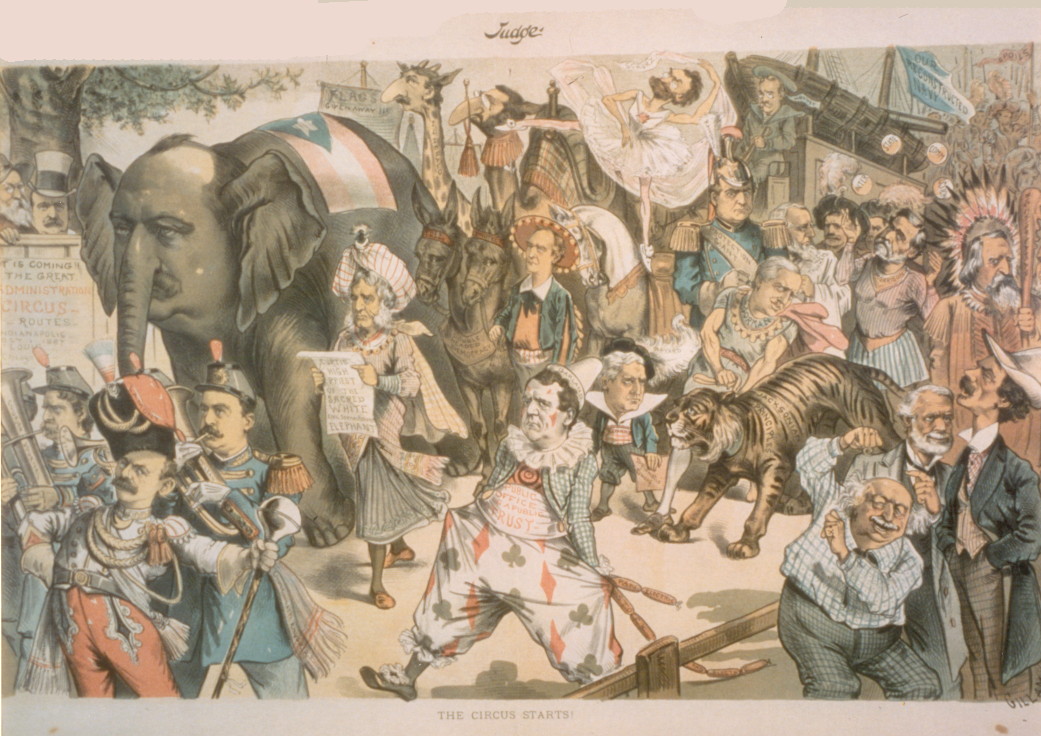Donate
Please consider supporting our efforts to preserve Garland's history by donating here:
See More

Cartoons & Illustrations
Augustus H. Garland Appears in JUDGE Magazine Cartoons
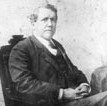 JUDGE was a magazine of political and social satire that appeared with varying format and frequency from 1881 through 1947. With support of ardent Republicans it skewered President Grover Cleveland, a Democrat, and his first administration (1885-1889), including Augustus H. Garland, the Attorney General. Widely circulated during the time, JUDGE could have played a role in Cleveland’s narrow loss to Republican Benjamin Harrison on November 6, 1888. While Cleveland won the popular vote nationally, he lost his home state of New York and the electoral vote to Harrison.
JUDGE was a magazine of political and social satire that appeared with varying format and frequency from 1881 through 1947. With support of ardent Republicans it skewered President Grover Cleveland, a Democrat, and his first administration (1885-1889), including Augustus H. Garland, the Attorney General. Widely circulated during the time, JUDGE could have played a role in Cleveland’s narrow loss to Republican Benjamin Harrison on November 6, 1888. While Cleveland won the popular vote nationally, he lost his home state of New York and the electoral vote to Harrison.
By the time Cleveland and Harrison settled their battle for the U. S. presidency, Embree and Duck Creek partisans had already settled the battle for control of acreage in northeast Dallas County. Due to Cleveland’s loss, Augustus H. Garland would soon retire from public office. But almost a year earlier, on December 9, 1887, postal authorities had ordered the Embree post office relocated to a mid-point between the two townships and renamed Garland, Texas in his honor.
In the election of 1892 Grover Cleveland reclaimed the White House from Harrison, becoming the only man elected president twice unsuccessively. An Act of Congress designated him as both the 22nd and 24th president. Augustus H. Garland did not serve in Cleveland’s second administration.
A. H. Garland, portrayed as a clown, marches in the foreground of the Cleveland administration circus parade. His waistband reads “Public Office is a Public Trust.” While the page bears no date, it presumably appeared in the early days of Cleveland’s first term, and other characters are lettered to suggest issues of the day. The cartoon’s largest element is an elephant, whose facial features resemble those of Stephen Grover Cleveland. Estimates of the president’s weight ranged from 250 to 350 pounds, and his nephews had nicknamed him Uncle Jumbo. Others recognized Cleveland’s bulk with the name Big Steve.
Cleveland’s Parti-colored Attorney General
July 17, 1886
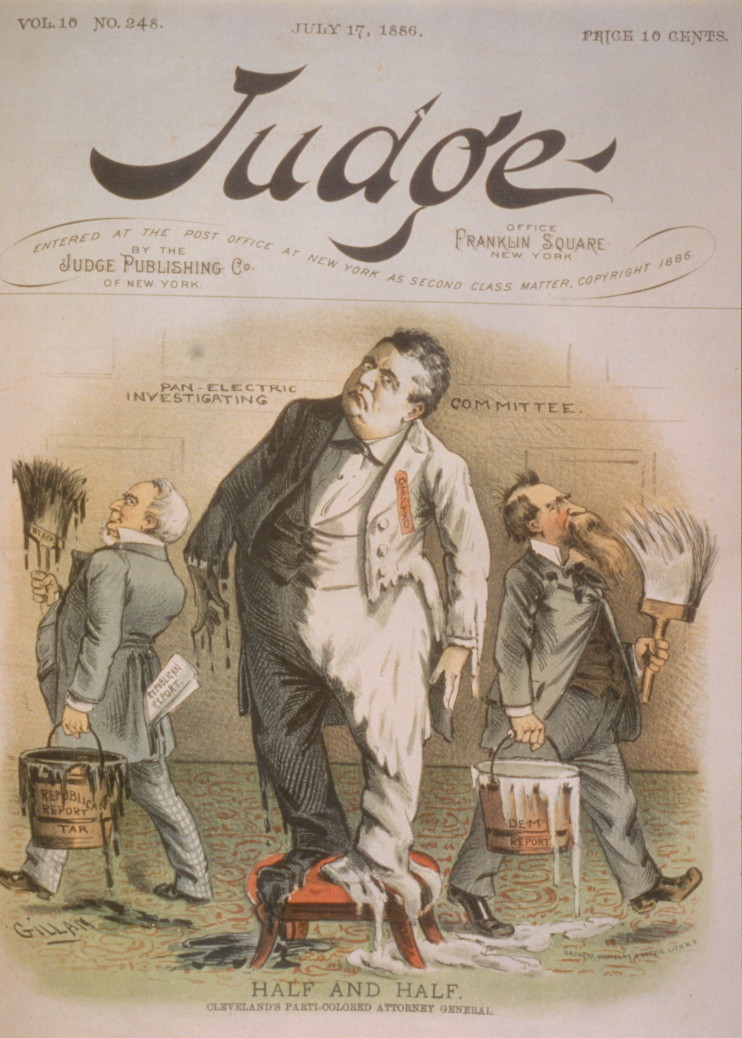
June 25, 1887
Mrs. Micawber (Garland)---"No, they may offer me a Supreme Judgeship, or wish to make me an Inter State Commissioner, but I'LL NEVER DESERT YOU, MR. MICAWBER!!"
Mr. Micawber (Cleveland)---"Oh, dear! I do hope something will turn up!"
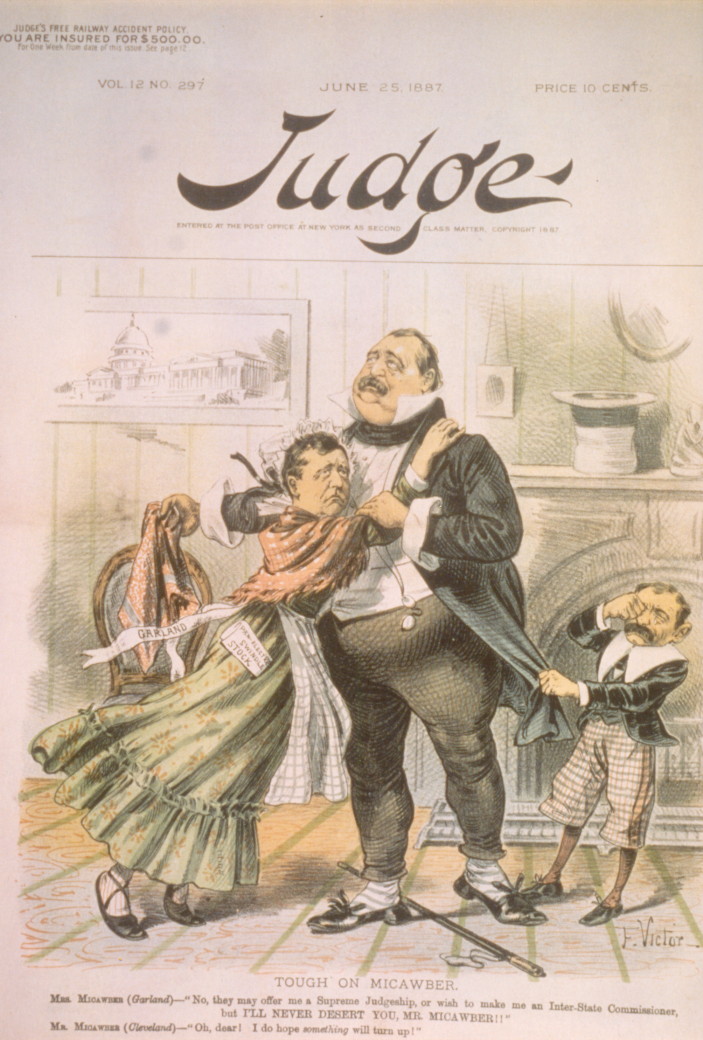
Sir Peter Teazle (Uncle Sam) Throwing down the sentimental screen---“Lady Pan-Electric by all things wonderful!"
Joseph Surface (Cleveland) understanding that the situation is very embarrassing---I am sure that you will agree with my sentiments when---
Sir Peter--- "Oh d___n your sentiments!"
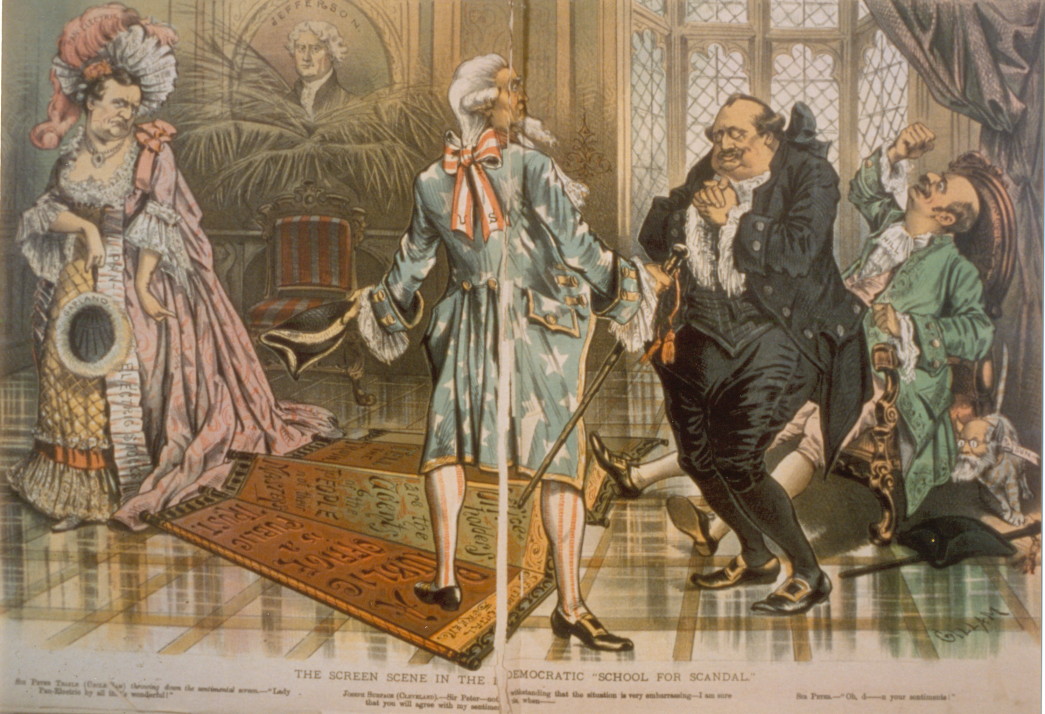 Garland, in dress at left, is caricatured as Lady Teazle, discovered behind a fallen screen in a scene from "School for Scandal." This comedy of manners, written by Richard Brinsley Sheridan, satirized the fickleness of reputation and the deceptive nature of appearances. The caption brands Garland as "Lady Pan-Electric" and implies that his fallen screen of honesty and trust has revealed his misdeeds. President Cleveland appears as the hypocritical Joseph Surface, whose secret involvement with Lady Teazle has been exposed.
Garland, in dress at left, is caricatured as Lady Teazle, discovered behind a fallen screen in a scene from "School for Scandal." This comedy of manners, written by Richard Brinsley Sheridan, satirized the fickleness of reputation and the deceptive nature of appearances. The caption brands Garland as "Lady Pan-Electric" and implies that his fallen screen of honesty and trust has revealed his misdeeds. President Cleveland appears as the hypocritical Joseph Surface, whose secret involvement with Lady Teazle has been exposed.
There are many things to show that the fires which burned up in the last campaign are not out yet, and there is some evidence that they are going to blaze up higher/” Henry George, Speech, April 16th.
Prophet Powderly---"Hear ye not the rumblings of you Labor Vesuvius! Beware the eruption! It will destroy you all and bury you out of sight in 1888!"
Democratic Leaders---(indifferently)---"Away, false croaker! We are too used to its grumblings to be frightened of them now."
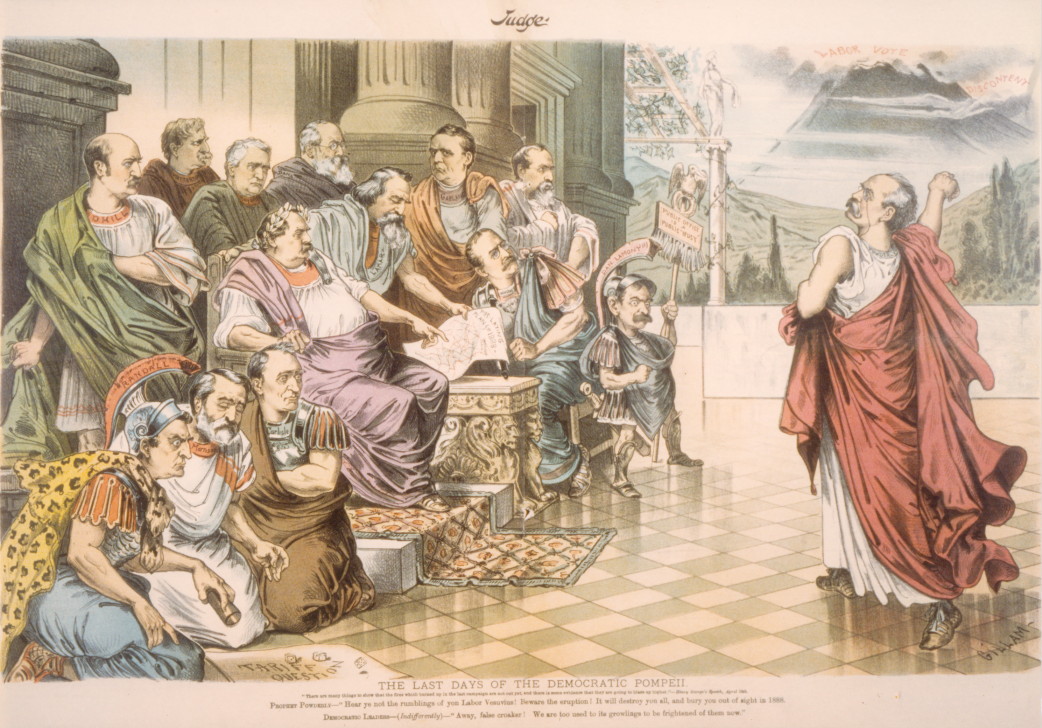 Garland, draped in orange, President Cleveland, and other officials of the first Cleveland administration are admonished by Terence V. "Prophet" Powderly, Grand Master Workman of the Knights of Labor. The "fires which burned…" quotation comes from a speech by Henry George, reformer and political figure of the day. His book Progress and Poverty criticized the distribution of wealth in industrial societies.
Garland, draped in orange, President Cleveland, and other officials of the first Cleveland administration are admonished by Terence V. "Prophet" Powderly, Grand Master Workman of the Knights of Labor. The "fires which burned…" quotation comes from a speech by Henry George, reformer and political figure of the day. His book Progress and Poverty criticized the distribution of wealth in industrial societies.
The cartoon title refers ominously to The Last Days of Pompeii, by the English baron Edward Bulwer-Lytton. This novel describes years of warning quakes, rumblings and other signs culminating in the eruption of Mount Vesuvius, which destroyed the Roman city of Pompeii in AD 79. Cleveland administration officials appear in this undated work as complacent citizens of Pompeii, indifferent to the warnings of their own destruction in the coming election of 1888, which they lost.

